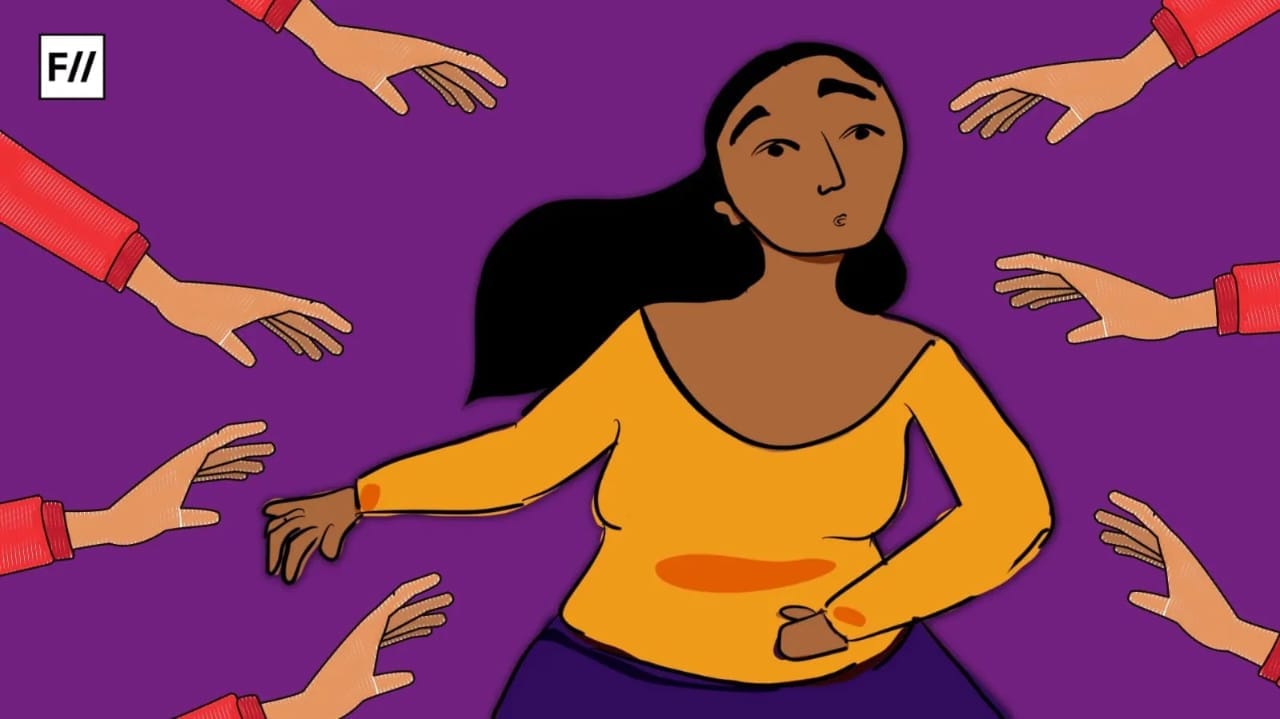When Raya Sarkar, a law student, compiled and published a crowdsourced list of alleged sexual harassers in academia (LoSHA) in 2017, many lamented how this could affect the repute of the men who were named. Soon after, in 2018, Leena Manimekalai, filmmaker, poet and activist, accused Susi Ganesan, a director and scriptwriter, of sexual harassment. Not surprisingly, ever since then it is Manimekalai who has been facing the consequences of speaking up. While Ganesan was quick to slam a defamation case against the Manimekalai in 2018, he also went on to file about 17 petitions that seized her travel documents and restricted her mobility.
Maadathy, Leena Manimekalai’s latest film, a commentary on caste-based sexual violence against women, continues to win critical acclaim from across the globe and has been a recipient of invitations for screenings and study at various universities including Harvard, Columbia, Chicago throughout the fall season this year. However, the imposition of travel restrictions on Manimekalai due to Ganesan’s petitions has made it impossible for her to travel.
Not just that, she has also been pursuing Masters in Fine Arts in York University in Canada on full scholarship. According to a letter to the High Court from the York University on behalf of Manimekalai, it is pertinent that she joins the course in person for the final two terms.
Leena Manimekalai has been pursuing Masters in Fine Arts in York University in Canada on full scholarship. According to a letter to the High Court from the York University on behalf of Manimekalai, it is pertinent that she joins the course in person for the final two terms.
Yet, the repercussions of calling out men in power is such that Manimekalai’s passport stands impounded by the Regional Passport Office despite having a valid student visa.
Also read: How Safe Are Women At Their Workplace After All?
According to a report by Bar and Bench, the passport authority mailed Leena Manimekalai in February 2021 issuing a show-cause notice for why her passport should not be impounded. While the filmmaker says she responded to the mail in March, she received yet another show-cause notice in August and was also notified of a Police Verification Report against her. Even though she responded to the mail the next day itself, her passport was impounded on September 9 by the Chennai RPO under the Passport Act of 1967 which states that if an offence by a passport holder is pending before the court then their passport could be impounded. The filmmaker has now moved the Madras high court to challenge the impounding of her passport.
Manimekalai’s ongoing fight for justice reminds us of the many instances of how survivors who have called out men in positions of power in the past were silenced by the accused who would use the muscle power of the judiciary which, in the recent past, has seemed to be anything but independent.
Former CJI and now Rajya Sabha MP Ranjan Gogoi convened a special bench in April 2019 and suo motu heard a case of sexual harassment allegations raised by a former junior Supreme Court staffer against him. A three-judge bench closed the case in February implying that the former CJI was being victimised as a part of a ‘wider conspiracy’. Journalist Priya Ramani was slapped with a criminal defamation case by MJ Akbar after she (among many others) accused him of sexual harassment.
Also read: The Judgment In Priya Ramani’s Case Could Have Been More Progressive
According to a survey published in 2020 by Gender at Work and the Network of Women in Media, India, over one-third of the respondents confirmed to have survived some kind of sexual harassment at workplace, with more than half of them choosing to not report the same. This is barely surprising, given how almost every time a survivor musters the courage to speak up, they are faced with questions such as “Why did you not speak up earlier?” “Why don’t you take recourse in law and ‘due process’.” These questions are not just essentially victim-blaming in nature, they also, intentionally or not, rush to protect the repute of the accused.
Leena Manimekalai’s case, wherein at present the future prospects of career opportunities look bleak, is an illustrated example of why it is difficult for the survivor to speak up. The onus, despite several amendments in law, continues to be inadvertently on the survivor to prove their claims and not on the accused to prove their innocence (or the lack of).
Nevertheless, Leena Manimekalai has been garnering support. Women in Cinema Collective (WCC) officially condemned the harassment the filmmaker has been facing and urged the film industry to come forward in support. Even though the silence from several quarters of the entertainment industry has been telling of how the ideal of safety of women at workplace is still a distant reality, there has been slow but steady mobilisation in support of Manimekalai’s rights.
Speaking on a panel for MOJO Story, Leena Manimekalai’s lawyer VS Senthil Kumar said that when the filmmaker had come forward to share her account of sexual harassment, she had done so not just for herself but for the sake of the entire society, only to now be made to feel like an accused.
Speaking on a panel for MOJO Story, Leena Manimekalai’s lawyer VS Senthil Kumar said that when the filmmaker had come forward to share her account of sexual harassment, she had done so not just for herself but for the sake of the entire society, only to now be made to feel like an accused.
This undoubtedly resonates with so many survivors who might have mustered the courage to call out the accused, to be shamed or silenced in return. Further, survivors often speak up at a cost. Among the many consequences they face, they find career opportunities dwindle, accompanied by a digital onslaught of their public image. Kathryn Mayorga’s rape accusations against Cristiano Ronaldo barely affected the stature and fandom the footballer commands across the globe. Meanwhile media and the Internet rushed to brand Mayorga a gold digger, even as Ronaldo agreed to the rape allegations.
It is, therefore, quite clear that men in power who stand accused of sexual harassment enjoy impunity extended to them not just by their personal echo chambers but also, in so many cases, that extended by the law of the state and media as well.
About the author(s)
Soumya is a Masters graduate in gender from Jamia Millia Islamia & has a PG Diploma in New Media from Asian College Of Journalism. She is learning to unlearn and question patriarchal structures with empathy. She has taken an interest in gardening but has over-watered and killed two plants already. This may or may not be a metaphorical reference to how she deals with life.



